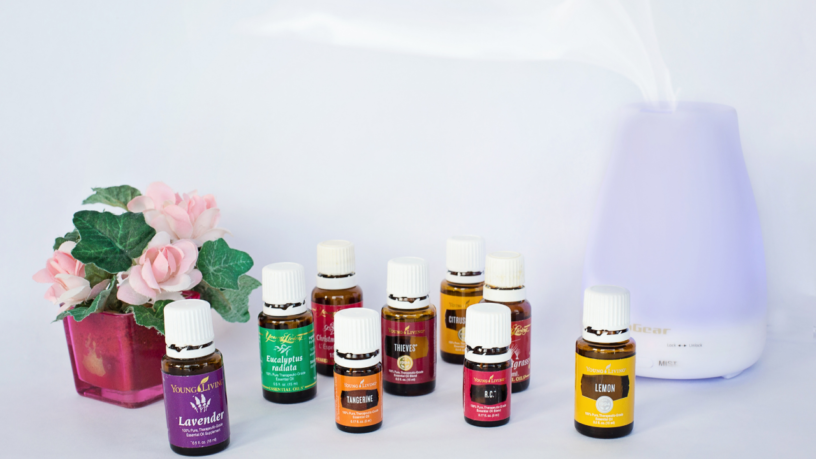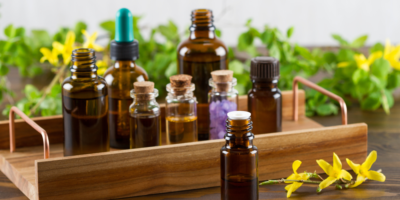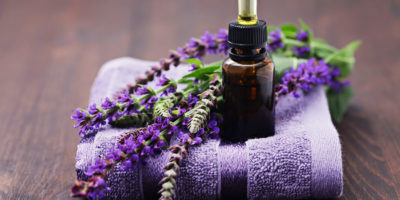Our sense of smell is more sensitive and immediate than any of our other senses, which is why aromas can be so evocative. Chemicals in a scent can trigger physiological responses and affect our mental state. These combined effects enable aromatic oils to work holistically on mind, body, and spirit, bringing balance, healing, and often a profound sense of well-being.


1. On the Mind
Essential oils can be used to help promote a state of mind. For example, stimulating oils can be used to enhance focus, while oils that are calming enable us to relax and help to combat the effects of stress.
1.1 Enhance well-being and mood


Essential oils have many components that affect the nervous system, helping to lift mood and enhance well-being. For example, studies show that the compound linalool in lavender and clary sage reduces anxiety, while limonene, found in many citrus oils, can ease anxiety and lift depression. Chamomile and bergamot essential oils contain the compounds alpha and beta-pinene, which also work as antidepressants, helping lift spirits and increase feelings of well-being.
When we feel anxious or depressed, it’s not just our minds that are affected; our bodies can also suffer. For example, we tend to hold tension in our muscles when we are anxious. Many oils have both mood-enhancing properties and physiological effects so they treat both the mental and physical symptoms of stress and anxiety.
An aromatherapy massage adds the inherently relaxing benefits of touch to an oil’s therapeutic effects, which can be profoundly calming and uplifting. Even without the benefit of touch, simply smelling a pleasant aroma, such as tangerine or vanilla bean, can reduce stress-induced muscle tension.
1.2 Promote relaxation
The relaxing effects of essential oils are well documented. How they help us relax is a complicated process thought to involve several parts of the brain. One theory is that linalool, found in oils such as lavender, regulates the neurohormone GABA (gamma-aminobutyric acid). This in turn regulates levels of adrenaline, noradrenaline, and dopamine.
1.3 Improve concentration and focus


Some oils clear and refresh. For example, inhaling rosemary oil has been shown to improve memory by up to 75 percent. The oil contains the compound eucalyptol, which acts in a similar way to dementia drugs by increasing a neurotransmitter called acetylcholine that helps regulate brain activity.
1.4 Balance energy
Many oils can relax or stimulate as needed and are called adaptogens. These balance body systems in a process called homeostasis, calming or stimulating. Adaptogens help the body process stress by recharging the adrenal glands, which can be overstimulated or exhausted from stress. Lavender, rose, and geranium is examples of adaptogens.
2. On the Body
Essential oils are natural healers, harnessing the medicinal properties that are traditionally associated with plants. For example, oils can be anti-inflammatory, antiseptic, and antifungal, and many essential oils are antimicrobial, helping to kill a whole variety of harmful microorganisms to protect us against disease.
2.1 Work as antiseptics


Many essential oils have been shown to destroy the bacteria, viruses, and fungi that cause infection. One of the best known antiseptic essential oils, tea tree, is thought to be as effective as conventional treatments for athlete’s foot, and recent research suggests that wounds infected with the Staphylococcus aureus bacterium heal faster when treated with tea tree oil than they do with conventional methods of treatment.
Chemical components, such as thymol found in thyme essential oil, menthol in peppermint, and eugenol in clove essential oil, to name but a few, have been shown to be powerfully antiseptic. Studies have demonstrated that inhaling these antiseptic essential oils can be as effective as applying them directly to the skin, and essential oil inhalation therapy has been used to treat the symptoms of bronchitis and acute sinusitis for many years.
In a world where many strains of bacteria are becoming resistant to conventional antibiotics, essential oils are beginning to be seen as a viable alternative.
2.2 Relieve pain and reduce inflammation


Essential oils are often used for their mild anesthetic properties that can relieve localized pain. Oils such as thyme, rose, eucalyptus, clove, bergamot, and fennel have been shown to work on the body in a similar way to nonsteroidal anti-inflammatory drugs (NSAIDs) such as ibuprofen, by inhibiting the enzymes in the body that cause inflammation, swelling, and pain. This analgesic effect makes these essential oils especially useful for soothing muscle and joint pains and for providing localized pain relief, for example from tension headaches and from sprains and strains.
Pain is often accompanied by inflammation. Many essential oils have anti-inflammatory properties. One notable example is frankincense. Several varieties of frankincense essential oil have been shown to inhibit the production of inflammatory proteins called cytokines and to prevent white blood cells, known as leukocytes, from leaking into tissues, both of which cause inflammation.
2.3 Have a cleansing action
When functioning properly, our lungs, liver, digestive system, kidneys, and skin all help to remove waste products and toxins from the body. Negative factors such as stress, anxiety, poor diet, and lack of sleep can all interfere with this process. Essential oils often have detoxifying properties that help to cleanse the body and support a healthy excretory system.
For example, a chemical called D-limonene, found in citrus fruits such as oranges, lemons, tangerines, limes, and grapefruits, supports the healthy functioning of the liver, as well as helping to regulate appetite and lower cholesterol. And juniper, grapefruit, rosemary, fennel, and cypress oils have a mild diuretic effect that helps to support the work of the kidneys by encouraging the elimination of excess water. Combining these oils with a gentle massage and body brush encourages the healthy circulation of blood and lymphatic fluid and in turn the removal of waste.
2.4 Help boost immunity


Essential oils promote wellness by enhancing and strengthening our immune response to disease. Some essential oils actually stimulate the production of disease-fighting white blood cells, such as phagocytes, T-cells, and B-cells, which are vital to the body’s defenses and immunity. In particular, eucalyptus and niaouli essential oils have been shown to encourage the process known as phagocytosis, where larger white blood cells called phagocytes engulf and then destroy, or deactivate bacteria and viruses.
The compound linalool, which is found in high levels in essential oils such as lavender, sage, bay laurel, and eucalyptus, has also been shown to increase the efficiency of the body’s white blood cells.
2.5 Influence hormones
The endocrine system secretes hormones to regulate the body’s processes. Essential oils can influence the action of hormones and smooth out imbalances. For example, relaxing rosemary has been shown to reduce levels of the stress hormone cortisol, and inhaling calming rose essential oil can help to decrease elevated levels of adrenaline. Several essential oils are thought to help regulate women’s hormones during different stages of reproductive life. Lavandin essential oil is believed to help control hormone-induced mood fluctuations, and clary sage, fennel, basil, sage, cypress, and geranium have a similar balancing effect.
3. On the Spirit
Essential oils have been used for thousands of years to enhance spiritual practice. From their use in traditional ceremonies to supporting personal spiritual practices such as meditation, essential oils help to support spiritual attainment.
3.1 Promote spiritual pursuit
Essentials oils have been used for millennia to support prayer. Historically, oils such as frankincense, myrrh, cinnamon, cedarwood, and rose have been used in religious ceremonies. A well-chosen fragrance can calm breathing, settle and focus the mind, and create a sense of intent.
3.2 Enhance mindful practices


Aromas that calm the mind or help to lift the spirits, found in oils such as lavender, elemi, and bergamot, can be used to enhance focus during practices such as meditation, yoga, and breathing techniques.
3.3 Energy and chi
In some traditional practices, essential oils are used to clear blockages in the chakras, believed to be the energy centers in the body that relate to specific glands and organs. Chakras are said to be connected by meridians, which are described as channels through which vital energy, or chi, flows.
Blockages in these areas are thought to lead to poor health in the related part of the body. The illustration shows the position of the seven chakras. Specific essential oils are associated with different chakras, or centers, and are recommended to help bring balance and healing to these areas.


- The crown chakra at the top of the head governs the pineal gland and our “inner self.” Oils such as frankincense, rose, jasmine, lavender, and elemi correspond with this area.
- The third eye chakra, located just above and between the eyes, is connected to the pituitary gland and rules memory and mind. Oils such as myrrh, sandalwood, and jasmine can be used to treat blockages here.
- The throat chakra covers the area of the throat and the thyroid gland and relates to communication. Try lavender, chamomile, clary sage, cajuput, peppermint, geranium, and rosemary to treat this area.
- The heart chakra, located around the heart and upper body, affects well-being. Useful oils include rose, bergamot, lemon balm, chamomile, neroli, sandalwood, and palmarosa.
- The solar plexus chakra includes organs in the upper abdomen and is connected to self-esteem. Try ginger, helichrysum, manuka, coriander, lavender, marjoram, and orange.
- The sacral chakra, located in the lower abdomen, is linked to the reproductive system and responds to essential oils such as sandalwood, jasmine, rose, ylang-ylang, orange, and geranium.
- The base chakra, at the base of the spine, connects to our ability to feel grounded. Oils that help to heal here include myrrh, cedarwood, patchouli, petitgrain, benzoin, carrot, and vetiver.






Leave a Reply